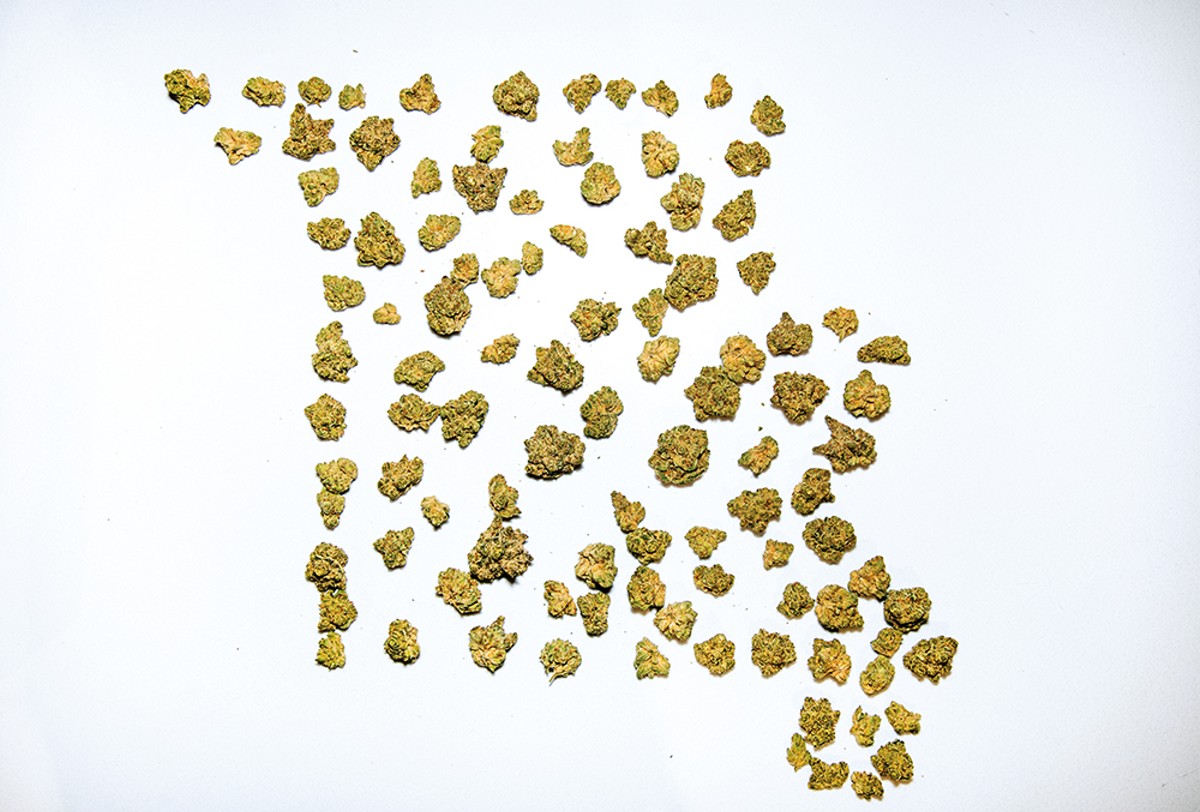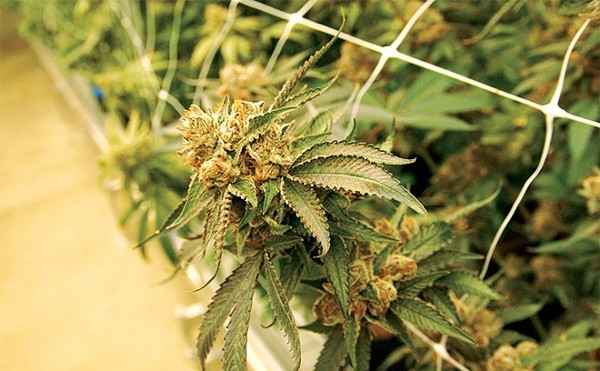Missouri's first year of (legal) recreational marijuana sales brought record-breaking profits and criminal justice reforms to the state.
The state said yes to Amendment 3 legalizing adult recreational use in November 2022, with 53 percent of voters approving. Sales began in December of that year.
Voters' decision to legalize recreational marijuana led to $1.3 billion in sales, making Missouri one of the 10 largest for the cannabis industry, according to MoCannTrade, Missouri's Cannabis Trade Organization. This means dispensaries have sold roughly $4 million of weed every day.
"The actual sales of adult-use cannabis in Missouri have really been remarkable, outpacing pretty much anybody's expectations," says John Payne, a member of MoCannTrade's board of directors. "There's really been quite strong demand and that's good to see. A lot of people are getting to work, getting jobs, and Missouri businesses are doing well."
Most notably though, last year brought historic criminal justice reform to Missouri by automatically expunging 100,000 non-violent marijuana convictions. Missouri is the first state to expunge these convictions automatically and uses a program paid for by taxes on cannabis sales, according to MoCannTrade.
"No other state has expunged that many that quickly. So that's really remarkable," Payne says.
Good Times
Chase Cookson, an instructor and cannabis researcher with Saint Louis University, describes the first year of recreational use in Missouri as "mind blowing."
"The fact that we exceeded a billion dollars is... I mean that blew my mind," Cookson says. "I definitely did not expect us to exceed a billion dollars in the first year. I really didn't expect us to exceed a billion dollars in the first few years. And so the fact that we did in this first year is just, it's pretty crazy."
The folks who are currently working in the cannabis industry are uniquely positioned for success, Cookson says.
MoCannTrade says the number of people employed by the industry in Missouri has increased from 9,383 to 20,000 people. And that number doesn't include ancillary employees who are peripherally involved in the trade as researchers, teachers and consultants like both Payne and Cookson.
That's nearly double the cannabis jobs that existed prior to the legalization of recreational use, making the industry one of the state's biggest job creators, according to MoCannTrade.
And since cannabis is now being taxed, the state's coffers have benefited as well.
Taxes being charged include 4 percent paid to the state for medical use and 6 percent for recreational use with the option for local municipalities to add a 3 percent local tax to sales (many did, and in some cases counties have stacked their own 3 percent as well).
Under the amendment legalizing recreational use, tax revenue first goes to carry out the provisions required of the amendment. After that, it's used to expunge the criminal records of those with marijuana convictions, and then any remaining funds are divided into three categories: the public defender system, the Missouri Veterans Commission and drug treatment services, according to the Missouri Budget Project.
Since the state's medical marijuana program began in 2019, the industry has brought in $150 million in taxes, according to the Missouri Independent.
A Few Hiccups
The record-breaking year wasn't without its rough patches.
At least one tax grab by a local government entity may have been unconstitutional, a pair of lawsuits claim. Filed against St. Louis County and Buchanan counties and the Missouri Department of Revenue, the suits allege that "dozens" of counties are illegally stacking local 3 percent taxes on top of a municipal 3 percent tax in violation of Article 14 of the Missouri Constitution.
"St. Louis County and others are violating this by placing a second 3 percent tax on marijuana sales occurring within incorporated areas that also happen to be within the county's boundaries," MoCannTrade explains. "The lawsuit seeks to overturn this unconstitutional stacking of local adult-use marijuana taxes. If successful, the lawsuit would save Missouri cannabis customers approximately $3 million per month and uphold the will of the voters." The suits remain pending in court.
In addition to the dispute regarding local taxes, the state's marijuana microbusiness license program has faced criticism.
These licenses are a provision of Amendment 3 intended to offer a legal entry into the industry for minority business owners and those who may have been directly impacted by the criminalization of marijuana. But Black Missourians have complained that the limits on the program are so great as to keep them from truly competing, because microlicense brands are limited to only selling and purchasing from other Missouri microlicensees.
Beyond that, despite the hopes of lifting Missouri minorities the Missouri Independent has reported that more than half of the applicants came from out of state — and 43 percent of them are connected to just three companies. The Division of Cannabis Regulation said it would revoke 11 of the 48 microlicenses issued in the first round last fall after determining they didn't meet eligibility requirements.
"The idea of creating access for smaller players to enter the market is a noble one, if it's done well," Cookson says. "My opinion of that particular portion of the adult use amendment is that it was a bone; it was offered up by folks in the industry who wanted to give the appearance of some kind of social equity program as part of the adult use amendment, but without actually risking having true competition."
Caps on the program, like the 50 plant limit for these small businesses, ensure that it is impossible for them to compete with the prices and selling capacity of larger dispensaries — a source of complaints from Black Missourians who had hoped for a fair shot in the industry.
Despite the obvious flaws with the program, it is unlikely to ever be fixed, Cookson says.
"Our opportunity to set that program up the right way was when we wrote the amendment and we did not do that," Cookson says. "It's our collective shame as activists that we have a program that looks like this, and that we let industry essentially write it."
Even so, Cookson sees a bright future for Missouri's cannabis industry and says the state can likely expect to exceed last year's record-breaking profits.
"I don't see anything on the horizon this year that would slow that down," Cookson says.
Subscribe to Riverfront Times newsletters.Follow us: Apple News | Google News | NewsBreak | Reddit | Instagram | Facebook | Twitter | Or sign up for our RSS Feed







